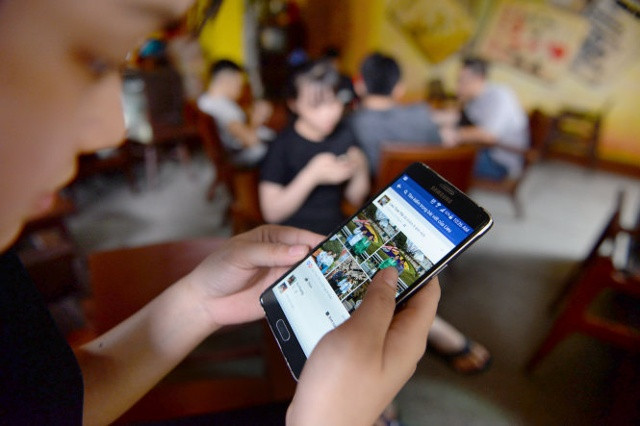Facebook addiction affects the nervous system
There have been many cases of schizophrenia, mental disorders, and depression identified as using Facebook (Facebook, Facebook) with high frequency.
 |
| Facebook addicts are prone to depression - Photo: HUU KHOA |
If you have tried to cut down on Facebook usage without success, feel restless if you are banned from Facebook, or use it so much that it negatively affects your life, work... then you may be addicted!
Convulsions because I can't access Facebook
The Institute of Mental Health, Bach Mai Hospital (Hanoi) held a press conference on Facebook addiction on the afternoon of July 21 after many cases of schizophrenia, mental disorders, and depression treated at the hospital recently were identified as using Facebook with high frequency.
After successful treatment of mental illness, the patient was no longer addicted to Face.
According to doctors, there is currently no disease called Face addiction, so there is no medicine to treat it. Treatment is still mainly psychological therapy and treatment of accompanying signs of mental illness (if any).
Mr. Nguyen Doan Phuong, director of the Institute of Mental Health, Bach Mai Hospital, said that three months ago, the hospital treated a male patient (14 years old, in Hanoi) who had a dissociative seizure because his parents confiscated his phone and did not allow him to access the internet.
The family said that for a long time, he had been using his phone to access Facebook for about 10 hours a day. Every time he came home from school, he would go to his room to play Facebook without paying attention to his surroundings, leading to poor academic performance and disrupted eating and sleeping hours. When his phone was confiscated, he became withdrawn and had frequent seizures.
When he went to the hospital for examination, he was diagnosed with dissociative disorder and had auditory hallucinations that forced him to play Face regularly.
After being treated for the above condition, I also stopped being addicted to Facebook.
Face Addiction is Related to... Low Self-Esteem
MSc. Le Thi Thu Ha, Institute of Mental Health, Bach Mai Hospital, said that there was once a student about 20 years old studying at a large university in Hanoi who was addicted to social networks, the Internet in general, and had to be hospitalized for treatment of depression. The consequences of Facebook addiction caused the patient to lose sleep, causing depression or vice versa.
This problem also creates a "spiral", because when abusing Face makes people not care about real life but only care about the virtual world, eating disorders, sleep disorders... aggravating mental symptoms.
According to Dr. Ha, through clinical examination and many studies, there seems to be a relationship between depression, low self-esteem and Facebook addiction.
The reason is that people with such personalities often turn to Face as a place to express themselves while not daring to express themselves in real life and tend to use Face with high frequency.
But on the contrary, Facebook is an open network, a place to share, so it attracts people with extroverted personalities.
According to Dr. Phuong, Facebook addicts are often young people such as students because this group's psychology is not really stable, they are easily attracted and agitated while they do not have to worry about life and therefore have a lot of "free" time.
How to quit addiction?
According to doctors, there is currently no specific time frame for the frequency of using Face, but if you use Face every day, regularly without internet or are prohibited, you feel restless, uncomfortable, or go on Face anytime, anywhere even when working, studying and using Face affects the quality of work, study... then you should stop.
According to Dr. Ha, the consequences of Facebook addiction are causing users to lose sleep, have poor social skills, reduce real relationships due to living "virtually", reduce work or study performance, and can lead to the use of addictive substances, stimulants...
However, Facebook addiction has common symptoms similar to other behavioral addictions, so it is not easy to give up immediately but needs to be done slowly, cutting down and adjusting little by little.
You can schedule specific activities during the day and follow that schedule. In particular, you should specify the number of hours you use Facebook during the day and record the number of hours you use during the day to control it.
If you find it difficult to cut down on Facebook, you can close your account, delete your account, and find other activities to fill your free time.
Mental health decline In April this year, the American channel CNBC reported on a study by experts from the University of California and Yale University, showing that frequent use of Facebook can cause feelings of sadness and depression. “Exposure to carefully crafted depictions of other people's lives leads to negative self-comparison, and social media interactions can distract people from real-life activities,” concludes research by Holly Shakya of the University of California, San Diego, and Nicholas Christakis of Yale University. For a study published in the American Journal of Epidemiology in 2017, Holly Shakya and Nicholas Christakis used data from 5,208 people between 2013 and 2015 to examine the relationship between Facebook activities and their physical health, mental health, and life satisfaction. The results showed that most Facebook use in one year was a precursor to poor mental health one year later. Another problem with social media that these two researchers point out is that social media gives people the feeling that they are participating in a meaningful social interaction. Meanwhile, “this connection cannot replace the real-world interactions we need to have for a healthy life,” say Holly Shakya and Nicholas Christakis. |
According to TTO
